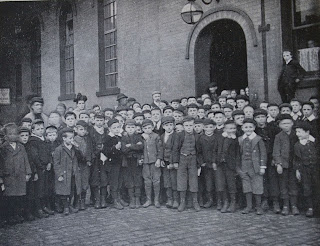Meet our orphans

“I’m Richard, 11 years old. I was in Salford Workhouse until my Mum got a job as a servant. I hope she manages to keep it with the amount she drinks. Would you like a game of cup and ball?” Richard, aged 11 We would like to introduce you to Richard. This is one of the lives we have been investigating during our young roots project ‘Deep Pockets and Dirty Faces’ . The quote above introduces our audience to this orphan, as he meets a new admission to the Manchester and Salford Boys’ and Girls’ Refuges and Homes. Throughout the radio script the young people involved in this project will tell the stories of their orphans, written through their own research into the individual children. It is their way of bringing these orphans' tales to life. Richard for example entered the homes in 1899 at the age of 11. His father had passed away and consequently the family had ended up in Salford Workhouse . His Mother had eventually managed to get a job as a domestic but could only take it...



